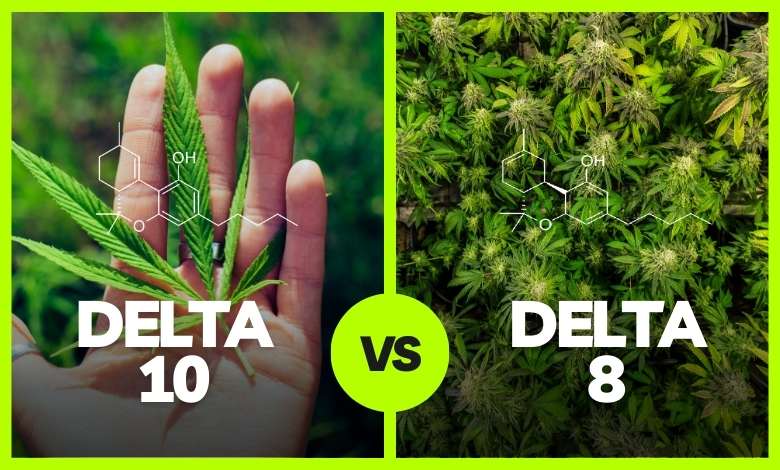Among the cannabis industry’s most notable compounds are Delta 8 and Delta 10. As derivatives of hemp, both compounds exhibit psychoactive properties, but they differ in their chemical structures and effects on the body. Understanding the differences between Delta 10 and Delta 8 is crucial for consumers seeking specific experiences or considering the potential benefits and risks associated with each compound. In this article, we will delve into Delta 10 vs Delta 8: What’s the Difference?
Table of contents:
- Delta 8 and Delta 10 Products
- What is Delta 10 THC?
- Delta-10 Benefits
- Delta-10 Side Effects
- What is Delta-8 THC?
- Delta-8 Benefits
- Delta-8 Side Effects
- Delta 10 THC vs Delta-8 TH
- How Do Delta-8 and Delta-10 Work?
- Delta 8 vs. Delta 10: Which is Better?
- Is Delta 10 stronger than Delta 8?
- Delta-10 vs Delta-8 FAQs
- Conclusion
Delta 8 and Delta 10 Products
When it comes to the best Delta 8 and Delta 10 products, there are a variety of options available in the market. The best products in this category are known for their high-quality ingredients, rigorous testing for purity and potency, and adherence to safety standards. Whether you’re looking for Delta 8 indica or Delta-10 indica, vape cartridges, gummies, tinctures, or other forms, it’s important to research reputable brands that prioritize transparency and provide detailed product information. With the right choice, you can experience the unique effects of Delta 8 and Delta 10 with confidence and peace of mind.
What is Delta 10 THC?
The psychoactive component of cannabis plants is tetrahydrocannabinol (THC). Cannabidiol (CBD) or other cannabinoids are converted into delta 10 THC using a process known as enzymatic hydrolysis. Delta 10 THC is known for its uplifting and energizing properties, often described as providing a clear-headed and focused experience.
Delta-10 Benefits
Delta-10, a relatively new and lesser-known cannabinoid, is believed to offer several potential benefits. While research is still in its early stages, anecdotal evidence and initial studies suggest that Delta-10 may provide uplifting and mood-enhancing effects. Users have reported feelings of euphoria, increased focus, and creativity when consuming Delta-10 products. Additionally, some individuals claim that Delta-10 may promote relaxation and stress relief without inducing sedation or lethargy.
Delta-10 Side Effects
While Delta-10 is considered to be a generally safe compound, it is important to be aware of potential side effects. Due to its psychoactive properties, consuming Delta-10 may cause mild to moderate effects such as dry mouth, red eyes, increased heart rate, and altered perception of time. Like any other cannabinoid, the way individuals respond to Delta-10 can differ, and it is advisable to seek guidance from a healthcare professional before using it, particularly if you have existing medical conditions or are currently on medication. Make sure Delta-10 is safe for you and does not negatively interact with any medications you take by consulting a healthcare professional.
What is Delta-8 THC?
Delta-8 THC, short for Delta-8 tetrahydrocannabinol, is a cannabinoid found in the cannabis plant. It shares similarities with the more widely recognized Delta-9 THC, but with distinct structural differences. Delta-8 THC is known to have psychoactive properties, albeit with reported effects that are typically described as milder and more nuanced when compared to Delta-9 THC. It binds to the body’s cannabinoid receptors, resulting in feelings of relaxation, euphoria, and potential therapeutic benefits. Delta-8 THC and Sativa Delta 8 has gained popularity for its potential to provide a balanced and manageable experience, making it a choice for those seeking the benefits of THC without the potential for overwhelming psychoactive effects.
Delta-8 Benefits
Delta-8 THC offers a range of potential benefits that have piqued the interest of many individuals. Users have reported experiencing mild euphoria, relaxation, and an overall sense of calmness when consuming Delta-8 products. Some people find that Delta-8 can enhance focus and creativity without inducing the same levels of anxiety or paranoia commonly associated with Delta-9 THC. It is imperative to remember, however, that Delta 8 strain still requires further study in order to fully understand its therapeutic potential and long-term effects.
Delta-8 Side Effects
Despite the fact that Delta-8 THC is generally well-tolerated, potential side effects should be considered. Due to its psychoactive nature, higher doses of Delta-8 THC can cause feelings of sedation, drowsiness, or even anxiety and paranoia in some individuals.
Delta 10 THC vs Delta-8 THC
Delta 10 vs Delta-8: Both are two distinct cannabinoid compounds that share similarities but also exhibit notable differences. In terms of effects, Delta-8 is generally known for its mild psychoactive properties, providing a balanced and manageable experience. On the other hand, Delta-10 is believed to offer uplifting and energizing effects, often described as providing a clear-headed and focused experience. Furthermore, while Delta-8 has been more extensively studied, Delta-10 is a newer discovery, and research on its effects and potential benefits is still in its early stages.
How Do Delta-8 and Delta-10 Work?
The endocannabinoid system (ECS) interacts with Delta-8 and Delta-10 in the same way as other cannabinoids. When Delta-8 or Delta-10 is consumed, it binds to the CB1 and CB2 receptors within the ECS, primarily affecting the CB1 receptors in the brain and nervous system. This interaction triggers a cascade of chemical signals that can result in various physiological and psychological effects. The specific mechanisms of action for Delta-8 and Delta-10 are still being studied, but their ability to bind to these receptors is thought to contribute to their psychoactive properties and potential therapeutic benefits.
Delta 8 vs. Delta 10: Which is Better?
Determining whether Delta-8 or Delta-10 is better ultimately depends on individual preferences and desired effects. A milder experience can be achieved with Delta-8 because it has balanced and manageable psychoactive effects. On the other hand, Delta-10 is believed to provide an uplifting and energizing experience, often described as clear-headed and focused. Individual preference, desired effects, and tolerance determine the choice between Delta-8 and Delta-10.
Is Delta 10 stronger than Delta 8?
Determining whether Delta-8 or Delta-10 is stronger is a complex question. Psychoactive properties are present in both compounds, but their effects and potencies can differ. A milder experience is offered by Delta-8 THC compared to Delta-9 THC.On the other hand, Delta-10 THC is believed to offer a different set of effects, often described as uplifting and energizing. However, since Delta-10 is a relatively new discovery, scientific research on its potency and effects is limited.
Delta-10 vs Delta-8 FAQs
Does Delta-10 Get You High?
Yes, Delta-10 THC can induce psychoactive effects, resulting in a “high” when consumed. While Delta-10 is considered to have milder psychoactive properties compared to Delta-9 THC, the most well-known form of THC, it still has the potential to alter perception, mood, and cognition. Users have reported experiencing feelings of euphoria, uplifted mood, and increased focus when consuming Delta-10 products.
Is Delta-10 Safe to Consume?
It is still being studied whether Delta-10 THC is safe, since it is a relatively new cannabinoid. Nevertheless, when used responsibly and moderately, Delta-10 appears to be generally safe. Like any cannabinoid, individual responses can vary, and some people may experience side effects such as dry mouth, red eyes, increased heart rate, or feelings of anxiety or paranoia.
Can Delta-10 Fail a Drug Test?
Yes, Delta-10 THC can cause a positive drug test result. However, since Delta-10 is structurally similar to Delta-9 THC, it can potentially cross-react with the tests and yield a false positive result. If you anticipate a drug test, it is advisable to avoid Delta-10 products to minimize the risk of a positive result.
How Long Does a Delta-10 High Last?
In addition to dosage, method of consumption, individual metabolism, and tolerance, Delta-10 THC can produce varying amounts of psychoactive effects. On average, the effects of Delta-10 THC can typically last for approximately 2 to 4 hours. However, it’s crucial to understand that the onset, peak, and duration of the high may vary from person to person.
How Long Does Delta-10 Show Up on a Drug Test?
The detection window for Delta-10 THC on a drug test is not well-established due to its relatively recent emergence. Most routine drug tests are unlikely to pick up Delta-10 THC because it differs structurally from Delta-9 THC. In addition, some drug tests include Delta-10 THC in their screening panels. This is something to keep in mind, as the sensitivity and specificity of drug tests can vary. To be on the safe side, if you anticipate a drug test, it is advisable to refrain from using Delta-10 products to avoid any potential issues.
How Long Does Delta 8 Last?
The effects of delta-8 THC last about 4 to 8 hours on average. However, it’s important to note that individual experiences may vary, and factors such as the potency of the product and the individual’s body chemistry can influence the length of the experience.
Does Delta-8 Show Up on Drug Tests?
Yes, it is possible for delta-8 THC to show up on a drug test. Some tests may specifically target Delta-8 THC, while others may not detect it as readily. To minimize the risk of a positive test result, you should avoid Delta-8 THC products if you anticipate a drug test.
Conclusion
Delta-10 and Delta-8 are distinct cannabinoid compounds that offer unique experiences and potential benefits. Chemically, they have different carbon chain locations for their double bonds. Although Delta-8 has been more extensively studied, Delta-10 is a newer discovery, and research on its effects is still in progress. Factors such as personal preference, desired effects, and individual tolerance play a crucial role in determining which compound is better suited for each individual.
Disclaimer – The contents of this article are provided solely for informational purposes and should not be considered medical advice. It is important to note that the information presented here is not meant to diagnose, treat, cure, or prevent any disease. Prior to embarking on any new health-related regimen, Always consult your healthcare provider before trying new supplements or treatments. Keeping you safe and well is our top priority. Additionally, it’s important to note that the FDA has not endorsed any claims regarding the health benefits of cannabis. Delta8Hub makes no guarantees or warranties regarding the accuracy, completeness, or usefulness of any messages contained here in.

